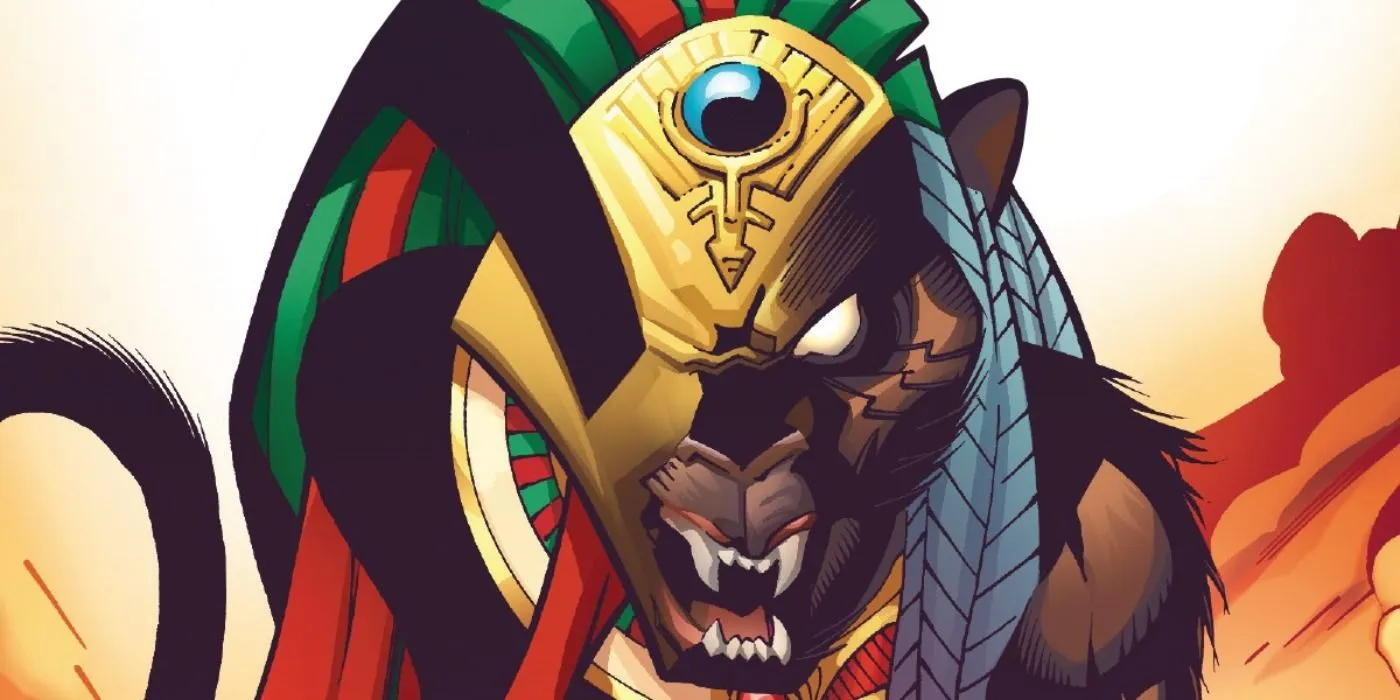The History of Bast, the Black Panther Goddess, in the MCU and Comics

With recent images of Thor: Love and Thunder teasing Bast’s humanoid introduction into the Marvel Cinematic Universe, it’s probably time to brush up on who this mysterious goddess is and where you’ve seen her before. Especially because she’s likely to weigh in on how to approach, if not outright fight, the main baddie, Gorr the God Butcher, played by Christian Bale in the upcoming movie.
As readers and movie watchers know, comic book writers are no stranger to including supernatural, mythological, and religious elements in their stories. In the MCU, most people probably think of Asgard (Norse), Moon Knight (Egyptian), and even Doctor Strange (Hinduism). The Eternals also represented a few from history—such as Mesopotamian, Greek, and Incan stories. But one often overlooked in these discussions is the mythology of the Wakandan people. This is where Bast comes in.
Bastet a.k.a. Bast
Wakanda’s mythology, the mythical place it is, is a mix of different African religious iconography and names (mostly) from antiquity. This includes using elements of ancient Egyptian mythology (called the Ennead within the comics) like Bast and her family. Many stories show Khonshu (introduced in Moon Knight) and Bast as cousins or cousins adjacent. Mostly represented by a cat, Bast is often cited as a moon-like goddess who watched over expecting mothers and young rulers. Sometimes she guides souls into the underworld. It’s important to note that religion and myth are not stagnant concepts, so the lore has some flexibility, depending on which time period and ruler is in power.
Bast is either depicted as a person, a large cat, or transitioning between forms within comics. She chooses each Black Panther to be her avatar or champion. In the MCU, T’Challa and others in Wakanda recognize Bast as a goddess who gave the first Black Panther, Bashenga, a guide (including the use of the herb to take on powers) to become the King and end the war between the five tribes of Wakanda. T’Chaka (John Kani) and later T’Challa (Chadwick Boseman) use this herb when they rule the kingdom and meet their family on the Ancestral Plane.
In Captain America: Civil War, T’Challa tells Black Widow that in his culture, “death is not the end. It’s more of a stepping-off point. You reach out with both hands and Bast and Sekhmet, they lead you into a green veld where…you can run forever.” The “green veld” where souls go refers to the Astral Plane (from Doctor Strange, etc.). However, there is no apparent difference between the Astral Plane and the Ancestral Plane in the MCU other than name and color. So, these may be the same places. Asgardians and Eternals haven’t crossed into these planes as far as we know because they are extraterrestrials within the MCU.
Bast showing up in the MCU
Because Bast hasn’t been formally introduced as a person, there are questions about which appearances of Bast are legitimate from the comics. However, the one place her name has continued to hold weight is, of course, Black Panther. In the intro sequence, when the narrator shares the founding of Wakanda, we see the animal form of Bast made up of vibranium grains towering over Bashenga. I don’t count this moment as seeing her because it was basically a moving sculpture, but that doesn’t diminish the way she is canonized in the MCU now.
Even without being seen, others reference Bast in the MCU. Sure, the most memorable is with Wakandans present, like in Captain America: Civil War and The Falcon and The Winter Soldier (episode 4). However, others invoke her name and image. While it was probably there for another reason, some noticed a traditional Bast statue in the Enternals‘ Domo (ship.) Recently, Moon Knight highlighted several of Bast’s family members and mentioned her by name.
In addition to this possible image of her (Akosia Sabet) in Thor: Love and Thunder, I wouldn’t be surprised if she made an appearance in Black Panther: Wakanda Forever. That is, if she doesn’t end up a casualty by the God Butcher.
(featured image: Marvel Comics)
—The Mary Sue has a strict comment policy that forbids, but is not limited to, personal insults toward anyone, hate speech, and trolling.—
Have a tip we should know? tips@themarysue.com